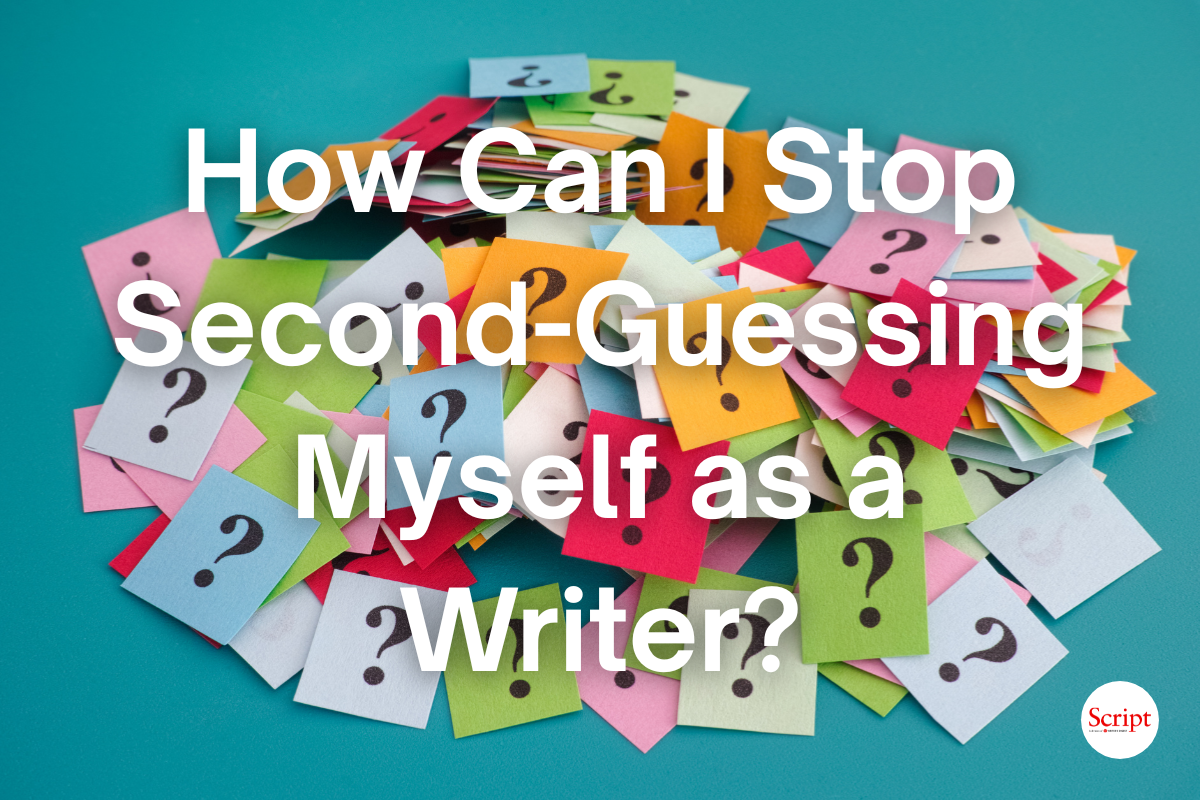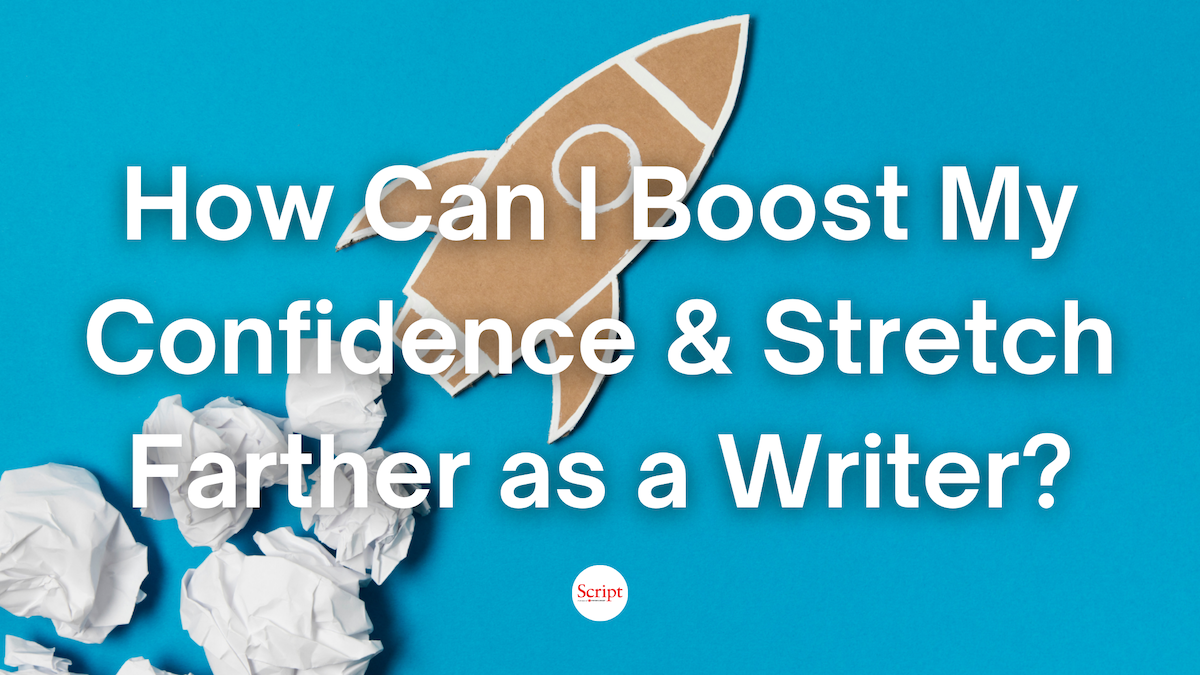Ask the Coach: When Should I Give Up On a Script?
In this installment of “Ask the Coach” Jenna Avery answers a pre-submitted question about when to toss in the towel on a work in progress or when to push forward on said script.
It’s time for the next installment of “Ask the Coach.” As a writing coach, I answer questions from writers about how to make the work of writing happen, as well as tackling craft questions in my editorial capacity. In today’s article, I’m answering a question about finishing.
(Got a question you’d like answered? Check out the details at the end of the article about how to submit one.)
Today’s question is specifically about when — or if — to give up on a project:
"How can I deal with the indecision that comes with looking at what I’m writing and reaching a point at which I say, “I never should have started this in the first place — no one will care about this, this is unoriginal, this has no chance of selling, what was I thinking?” I don’t see a point at continuing and then go on to the next potentially shiny object. Very frustrating and totally within my control. What do you recommend?"
Great question!
In order to help you answer it, I have some questions for you.
1. Does this feel like resistance or intuition?
The first thing to consider is whether or not this inner voice speaking up is the voice of resistance, or the voice of intuition.
Resistance is the naysayer and doom-speaker whose existence is dedicated solely to keep you from finishing work and putting it out into the world, usually in order to protect you from some kind of perceived harm (like embarrassment or “failure”).
Intuition is the sage, the speaker of inner wisdom, dedicated to keeping you in alignment with your truest self, higher goals, and greater calling. The muse and intuition work together to help you keep moving more and more fully into your creative expression as a writer.
When a writer comes to me feeling uncertain whether or not to finish a project, this is a first place I look. Ultimately, only the writer themselves will truly know which voice is speaking, however, there are some clues to point the way.
Something to look for is the kind of questions and statements the inner voice asks and makes, and the way they’re phrased. “What was I thinking?” “this is unoriginal,” and “no one will care about this” point to resistance as the culprit. Resistance come across as harsh, critical, stressful, negative, and “loud” statements or questions like these.
Intuition, on the other hand, tends to be “quiet,” creative, and grounded. It might still make statements or ask questions, but they tend to be less harsh, like “something feels off here,” or “is this working well?” or “is this strong enough?”
When you’re finding yourself questioning, try to tune in and see where the voice is coming from. If it’s the voice of resistance, trying to keep you “safe” from fulfilling your calling, you probably don’t want to listen to it. If it’s the voice of intuition, pay attention.
2. Are the doubts actually valuable information about ways the script isn’t working?
Sometimes resistance goes bananas with these negative questions and statements in an odd hybrid of doubt and intuition.
In other words, a deeper part of yourself might know something about a script isn’t working and has been speaking up, maybe for a while now, but perhaps you haven’t quite been catching on or knowing how to solve the problem its pinpointing.
Resistance, though, is always on the lookout for anything that might be going wrong and will start flashing the red alert lights and sirens at any chance it can get. So it could be amplifying the quieter questions, letting you know that there in fact IS something about the story that’s not working and needs fixing, but then is also drawing the wrong conclusion about what this means.
The voice of fear and doubt says, “there’s something wrong, give up now, it’s doomed, scrap the project.”
The voice of inner wisdom says, “there’s something wrong, time to do the hard work and fix it.”
Take a step back and evaluate. Is there something that’s not working you’ve been ignoring or feeling reluctant to face tackling? Is the script fully delivering on your vision? Are you willing to do the hard work to figure it out (even if part of that work is getting help) and finish the script?
Maybe, just maybe, those negative questions and thoughts are pointing you toward the work you really need to do.
3. What inspired you to take on the project originally?
When you’re trying to decide whether or not to walk away from a story, it’s smart to circle back to your original reasons for beginning the script and reminding yourself what excited you about it in the first place. Sometimes, mid-project, it’s hard to remember the Big Why behind your initial inspiration, and reconnecting with it can be enough to get you jump-started again.
It’s also possible that you’ve outgrown a particular story idea and that it no longer interests you, but again, be suspicious that resistance is trying to stop you. Boredom and creative apathy are common smokescreens for resistance, and tend to crop up right when we’re closing in on “done.”
Use your original motivation to see if the spark for the project still exists. Also check to see if you’ve strayed from your early ideas enough that a course correction is required to get back on track with your original vision, which might re-inspire you.
4. What case would you make not to continue?
It’s been at least 20 years since I watched Dr. Phil on Oprah’s network TV series but something he said about relationships always stuck with me. When someone was contemplating leaving a marriage, he’d say, “you have to earn your way out of it.” What he meant was that if you wanted to give up on something as important as a marriage commitment, you had to leave no stone unturned, untried, or untested when it came to making the decision.
I feel the same way about a story. I generally believe we owe it to ourselves to take a story all the way to first draft completion and then decide whether or not it’s worth continuing.
(At the same time, we also owe it to ourselves to test our concepts before writing them, to see if they can go the distance.)
So more specifically, what happens if we’ve gotten a long way down the road with a project that we’re questioning. What if it just doesn’t actually work? How do we know when to throw in the towel? I recommend carefully evaluating the project before you make that determination. Make a case for and against continuing with the script.
For example, you might consider questions like:
- What does your gut say about this project? Your head? Your heart?
- Is the story’s concept strong enough to sustain its intended length? If not currently, how could it be further developed?
- What’s your sense of the script’s marketability?
- How well is the script delivering (so far) on the initial concept?
- Is the concept original? Familiar but different?
- Are the characters fresh, interesting, and unique? If not, how could they be?
- Are you still interested in/passionate/excited about the story?
- What about the story do you love? Like? Dislike? Hate?
- What problem areas are you aware of? How might you solve them? What would it take?
- How much is there left to go? (Be extra careful about giving up on something you’re close to done with!)
- Are you avoiding doing the hard work of getting this story to work? Are you being unrealistic about what that takes?
- Has your life changed in such a way that this project no longer fits for you?
- What’s the cost of not finishing? How will it impact you as a writer? Is this a consistent pattern for you, or an outlier?
Give yourself the opportunity to write out the answers to these (and/or other questions you deem important) and then use them to assess the script. Is this project worth continuing?
While I generally believe in giving ourselves the opportunity to learn through completion (at least to a first draft stage), there may be projects that just aren’t worth putting more time into. My proposal to you is that you consciously and objectively evaluate a project so you can feel solid and clear about putting it out to pasture and moving on to something new.
Parting thoughts
Giving up on a work in progress is not something to be taken lightly. When you invest time, energy, and passion into something, you’ll want to make sure you’re giving it its due before walking away. On the other hand, there may well be projects that just don’t have the legs to go the distance, and your time may be better spent elsewhere. Give your project the gift of an objective, thorough evaluation as you make the decision about whether to finish or not. If you make the commitment to finish, see it all the way through to Fade Out before you evaluate again.
Submit your question to be answered anonymously via my online form here or send an email directly to askthecoach@calledtowrite.com. Look for answers to selected questions in my monthly “Ask the Coach” column on the third Thursday of the month.







